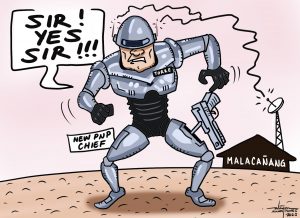BY HERMAN M. LAGON
HAS SOMEONE ever cut you off in the middle of a meeting while you confidently presented an idea, making himself the center of attention while downplaying yours? Places of work are like this all over the world. In addition to misbehaving, those who put down others to elevate themselves are also displaying deeper psychological issues, which are frequently caused by insecurity and low self-esteem.
People want to make a good impression at work because they are constantly judged on their work, and the consequences of their actions are usually severe. Sadly, this can sometimes make people act badly, like when they need to put others down to show how much better they are. However, why does this occur? Despite their apparent diversity, the causes frequently stem from psychological problems that are widespread, such as narcissism, envy, and insecurity.
Low self-esteem, the most common underlying factor, contributes significantly to this conduct. People who are constantly insecure worry that they do not measure up and secretly compare themselves to their coworkers. Some people find that making fun of others gives them a short-term sense of relief and takes the focus off of the flaws they think they have. They temporarily feel superior to others when they draw attention to their flaws, which takes attention away from their vulnerabilities. However, this tactic, although briefly successful, is short-lived and expensive—it alienates their peers, especially the wiser ones, and fosters a hostile atmosphere.
But narcissism presents an alternative viewpoint. Individuals with narcissistic tendencies denigrate others due to an exaggerated perception of their value, in contrast to insecurity-driven behavior, which stems from self-doubt. Narcissists frequently function under the delusion that they are intrinsically better than others, and to uphold this delusion, they minimize those around them. Demeaning others reinforces their self-image, ensuring they remain the smartest person in the room—or so they believe. In this dynamic, the workplace becomes less about collaboration and more about dominance.
Social comparison theory also highlights why this behavior persists in professional settings. In a world where promotions, recognition, and salary raises are at stake, people often evaluate their self-worth by comparing themselves to colleagues. This can lead to harmful patterns of putting others down to feel better about their own standing. The more they can lower someone else’s achievements, the higher they elevate their own—at least in their mind. It is a precarious cycle fueled by competition and the ever-present need to be seen, usually by their bosses and associates, as competent or superior.
Another common psychological defense mechanism in the workplace is projection. People who are insecure about themselves may project their flaws onto other people. To hide their fear of public speaking, someone uneasy about their communication abilities might, for example, make fun of or critique a colleague’s presentation. By discrediting others, they divert attention from their own fears and avoid facing their own perceived shortcomings.
Hierarchical work environments also involve power dynamics. It is common for managers and team leaders to feel compelled to demonstrate their dominance by disparaging those in subordinate positions, thereby perpetuating an unequal power dynamic. In these situations, the demeaning actions are motivated by control maintenance as much as insecurity. It is a tactic to keep others in check and prevent anyone from challenging their authority.
Envy is yet another common trigger. In a competitive work environment, it is not uncommon for individuals to feel envious of colleagues who seem to excel effortlessly. This envy can quickly turn into resentment, and instead of striving to improve, some people belittle those they covet. This gives them a temporary sense of satisfaction, as if by criticizing the success of others, they are leveling the playing field.
Bullying and aggression are the more overt manifestations of this behavior. Some people put others down to assert dominance. In this context, belittling becomes a form of workplace bullying—a tactic to undermine others and secure one’s position. This behavior, typical in government political dynamics, is particularly toxic because it harms the targeted individual and fosters a culture of fear and resentment within the team.
Other labels may be applied to this behavior, such as defensive pessimism, Tall Poppy Syndrome, or superiority complex. Still, the end effect is always the same: people try to make themselves seem better by discrediting others. These actions speak to a deep sense of inadequacy or an exaggerated sense of self rather than strength or competence.
Interestingly, research on workplace dynamics indicates that supportive teams outperform competitive teams on average. According to a 2021 Society for Human Resource Management survey, workplaces with greater levels of employee support and collaboration report stronger productivity and lower turnover rates. This suggests that disparaging other people hurts the organization and the individuals involved.
The good news is that there is room for improvement in comprehending the psychology underlying these actions. People who constantly criticize others might find it helpful to reflect on what they are afraid of and why they need to act this way. A culture of open communication, emotional intelligence, and self-awareness can help businesses reduce bad behavior. I cannot stress enough that people in charge must set a good example for others by being polite and not mean at work.
On a more personal level, what should you do if this behavior is directed at you? It is critical to understand that the person making the disparaging remarks frequently has nothing to do with you and everything to do with them. Their actions reflect their inner conflicts rather than an assessment of their value or abilities. Setting limits, maintaining confidence, and concentrating on your wellness and personal development are crucial in these circumstances.
In Filipino culture, pakikisama (getting along with others) and respect are deeply ingrained values, especially in the workplace. These values starkly contrast with the negative behaviors of belittling others we have discussed. It is impossible to foster harmonious and productive work environments if people are tearing each other down. Instead, workplaces should nurture relationships built on mutual respect, understanding, and support. By promoting these values, organizations can discourage harmful behaviors and create an atmosphere where collaboration and collective success thrive.
Even though putting other people down to look better might help you in the short term, you cannot keep doing this over time. This behavior has a lot more negative effects than positive ones. It could be caused by jealousy, insecurity, or needing to be in charge. It erodes relationships, fosters hatred, and eventually impedes one’s ability to advance both personally and professionally.
Perhaps it is time to ask those constantly making fun of others: What are you attempting to prove, and at what cost? The true challenge is to uplift oneself via self-awareness, empathy, and a dedication to mutual success rather than to bring others down. After all, real leadership is about uplifting people, not pulling them down, whether in the workplace or elsewhere.
***
Doc H fondly describes himself as a “student of and for life” who, like many others, aspires to a life-giving and why-driven world grounded in social justice and the pursuit of happiness. His views do not necessarily reflect those of the institutions he is employed or connected with.


